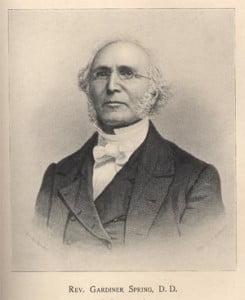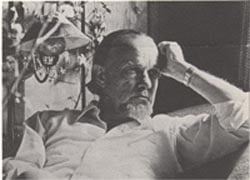This Day in Presbyterian History:
A Political Issue Divides the Old School General Assembly
 With the Old School General Assembly meeting on May 16, 1861, the unity of the nation was at stake. Fort Sumter in Charleston, South Carolina has been attacked and captured. Southern states had already seceded from the Union. The slavery issue, which had been debated in previous assemblies, became secondary to the important matter of preserving the union. Thus, Rev. Gardiner Spring, the pastor of Brick Presbyterian Church in New York City, New York suggested that a committee be formed to consider the following resolutions before the assembled elders.
With the Old School General Assembly meeting on May 16, 1861, the unity of the nation was at stake. Fort Sumter in Charleston, South Carolina has been attacked and captured. Southern states had already seceded from the Union. The slavery issue, which had been debated in previous assemblies, became secondary to the important matter of preserving the union. Thus, Rev. Gardiner Spring, the pastor of Brick Presbyterian Church in New York City, New York suggested that a committee be formed to consider the following resolutions before the assembled elders.
“Resolved, 1. That in view of the present agitated and unhappy condition of this country, the first day of July next be hereby set apart as a day of prayer throughout our bounds; and that on this day ministers and people are called on humbly to confess our national sins; to offer our thanks to the Father of light for his abundant and undeserved goodness towards us as a nation; to seek his guidance and blessing upon our rulers, and their counsels, as well as on the Congress of the United States about to assembly; and to implore him, in the name of Jesus Christ, the great High Priest of the Christian profession, to turn away his anger from us, and speedily restore to us the blessings of an honorable peace.
Resolved, 2 That this General Assembly, in the spirit of that Christian patriotism . . . do hereby acknowledge and declare our obligations to promote and perpetuate . . . the integrity of the United States, and to strengthen, uphold, and encourage the Federal Government in the exercise of all its functions under our noble Constitution: and to this Constitution, . . . we profess our unabated loyalty.”
Interestingly, some of the main opposition to this resolution came from Dr. Charles Hodge, of Princeton Theological Seminary. He protested that the General Assembly had no right to decide to what government the allegiance of Presbyterians is due, that it was neither North nor South. His alternate resolutions lost before the assembly. When the issue came to a vote, with an amendment offered by John Witherspoon II, the Spring Resolutions, as they were known in church history, passed by 156 to 66. Tragically, they also brought about the schism between Old School Presbyterians, dividing North and South.
To read a full account of what came to be called the Gardiner Spring Resolutions, click here.
Words to Live By: There is a reason why the Confessional Fathers in chapter 31:3 specifically stated that “Synods and councils are to handle, or conclude nothing, but that which is ecclesiastical; and are not to intermeddle with civil affairs which concern the commonwealth, unless by way of humble petition in cases extraordinary; or, by way of advice, for satisfaction of conscience, if they be thereunto required by the civil magistrate.”
Through the Scriptures: Psalms 106 – 108
Through the Standards: Ingredients of repentance in the Confession
WCF 15:2
“By it (i.e., by repentance), a sinner, out of the sight and sense not only of the danger, but also of the filthiness and odiousness of his sins, as contrary to the holy nature, and righteous law of God; and upon the apprehension of His mercy in Christ to such as are penitent, so grieves for, and hates his sins, as to turn from them all unto God, purposing and endeavoring to walk with Him in all the ways of His commandments.”

